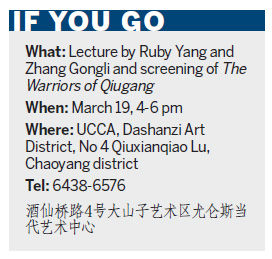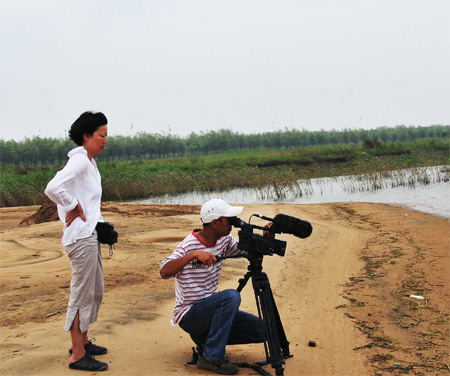Culture
Finding hope in people's stories
By Han Bingbin (China Daily)
Updated: 2011-03-14 07:57
 |
Large Medium Small |
|
Ruby Yang (left) films a scene for her documentary The Warriors of Qiugang. [Photo/China Daily] |
Ruby Yang's China trilogy gives an outsider's perspective on the changes transforming the country. Han Bingbin reports.
In 2007, when Ruby Yang won an Oscar for her 39-minute documentary The Blood of Yingzhou District, a moving look at the lives of Chinese orphans whose parents had died of AIDS, the Hong Kong-born and United States-raised director in her imperfect Chinese delivered her sincerest thanks to "all anti-AIDS heroes". One month later she was in East China's Anhui province in search of the protagonists for her next project on environmental protection heroes.
It took Yang and her colleague Thomas Lennon three years to finish the project, including almost a year of preparation. The result was 80 hours of footage shot at different places along the Huaihe River, which Yang finally cut so that it focused on the village of Qiugang, whose story she found "the strongest and most complete".
After editing more than 40 different versions in five months, she finally settled on a 39-minute masterpiece called The Warriors of Qiugang, which this year won her another Oscar nomination in the "best short documentary" category.
"The reason it took so long is that while editing we kept inviting documentary professionals and other people to share their comments and then we'd make adjustments. We really wanted to tell the story objectively and clearly," Yang said.
The documentary focuses on a farmer named Zhang Gongli who studied law so he could fight a chemical factory that was polluting Huaihe River and his farmland and damaging the health of many villagers.
To stop the factory polluting the river, Zhang didn't just appeal to higher authorities, instead, he studied law, attended environmental forums with the help of an NGO and put the factory under public pressure by talking to the media.
Zhang eventually prompted the local government to force the factory to move out of the village.
According to Yang, the shooting process was very smooth as the villagers were very cooperative, "although they occasionally only showed me what they wanted me to see", which would distract her focus. The village officials didn't try to stop them filming, but neither did they want to talk.
"We were not able to talk to officials. But to be objective, we talked to as many people as possible including journalists, experts and NGO people," Yang said.
The only thing Yang found truly worrying was that during the first two years of shooting the factory didn't show any sign of shutting down.

"Then the whole story would have ended up with no hope," Yang said. That is why she waited a year to finish the documentary so she could film again when the factory finally closed down in 2009.
Hope is what Yang has in her mind when shooting all her films. Though she has often deals with the problems of Chinese society, she remains very optimistic about the future of the country.
"In terms of the environmental situation, I think China will gradually improve. All Western countries had to make this journey too," she said. "Actually China has laws requiring transparency in building chemical factories, so the key point of the film is to let the audience know that common people can participate in the process."
Along with The Warriors of Qiugang, The Blood of Yingzhou District and Tongzhi in Love make up Yang's China trilogy.
The latter, a 30-minute documentary shot in 2008, deals with the struggles of three homosexual people in Beijing.
"Years ago, people couldn't even talk about being gay in China, but now many people, especially in big cities, are becoming more tolerant of it," Yang said.
Chinese society is changing rapidly, she added.
"Those AIDS children, for example, were once also disadvantaged and discriminated against. Six years ago, things could be very bad, but you see their life now has changed significantly."
Because of the changes China is going through, Yang said now is "China's best time for documentaries".
"My first three years living in Beijing, I witnessed changes that took a whole decade in the United States. And there is great drama in change. I am privileged to record it," she said.
It's this dynamic vitality of China that attracted Yang to make her home in Beijing where she has lived since 2004. Apart from shooting her China Trilogy, she has worked with the Ministry of Health and China Central Television on public service advertising mainly to promote AIDS awareness.
Her first contact with the country came in 2001 when she came to shoot a documentary called China 21 that explored the psychology of Chinese youngsters at that time and the general situation of Chinese families both in the cities and countryside.
The film, along with Citizen Hong Kong, another milestone work that explored the psychology of young people in Hong Kong after 1997, were both broadcast on PBS in the US. Many universities in the US and Hong Kong now use the two films for Asian studies.
Calling herself a bridge between Chinese society and foreign audiences, Yang said, "My perspective is different from that of local directors, which allows foreign audiences to easily understand what I am saying.
"It's not that I am smarter and more profound than native Chinese documentary directors, it's just that as an outsider you see the country more clearly."
Yang's earlier work focused on the lives of Chinese-Americans, including A Moment in Time, a documentary about six movie theaters in San Francisco's Chinatown that "crystallized the memories, the beliefs, the sorrows and aspirations of Chinese immigrant families" that Yang finished shooting in 2009.
"Documentary is a very good way of telling stories and giving voices to people who don't have voices," she said. "American society at that time didn't understand Chinese-Americans, so I was pushing for their broader media representation."
But after so many years of devotion to documentaries, the director is now seriously considering making her first feature film. Her potential theme is the life of Africans in China.
For years Yang worked as an editor on feature films. She was the magic hand behind films such as The Joy Luck Club directed by Wayne Wang and Joan Chen's The Sent-down Girl.
Part of the motivation behind this is that she wants her work to reach a larger audience, but, more importantly, she said films would allow her to express herself more subjectively.
"There are things you can do in films that you can't do in documentaries." she said.
| 分享按钮 |
